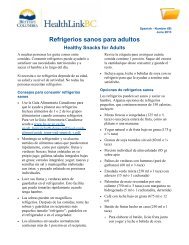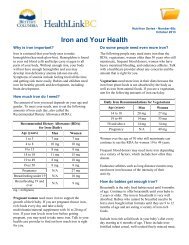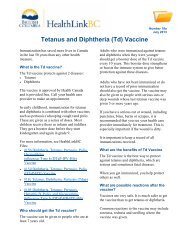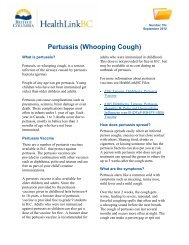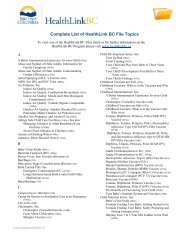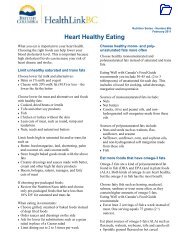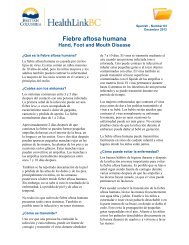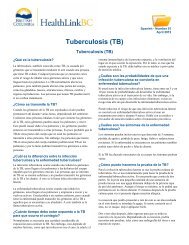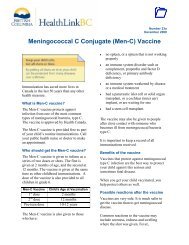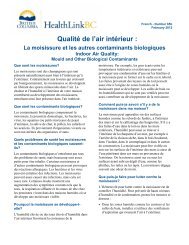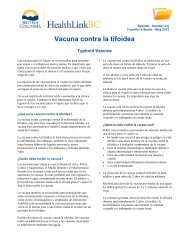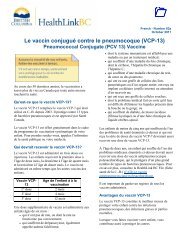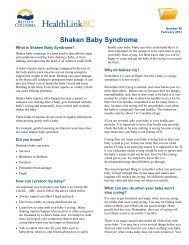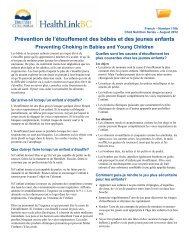English - HealthLinkBC
English - HealthLinkBC
English - HealthLinkBC
You also want an ePaper? Increase the reach of your titles
YUMPU automatically turns print PDFs into web optimized ePapers that Google loves.
Number 50f<br />
August 2013<br />
Grade 6 Immunizations in B.C.<br />
Vaccines are the best way to protect your child against many<br />
diseases and their complications. When you get your child<br />
immunized, you help protect others as well.<br />
The hepatitis B, meningococcal C and chickenpox vaccines are<br />
offered to all students in grade 6. The human papillomavirus<br />
(HPV) vaccine is offered to female students.<br />
It is important to keep a record of all immunizations that your<br />
child has received, and to ensure that they have had all doses of<br />
the recommended childhood vaccines that they are eligible for. If<br />
you have any questions please speak with your health care<br />
provider or visit www.immunizebc.ca for more information.<br />
What is hepatitis B vaccine?<br />
Hepatitis B vaccine protects against the hepatitis B virus. Most<br />
children in grade 6 will have received 3 doses of the vaccine at a<br />
younger age. Hepatitis B vaccine will be provided to students in<br />
grade 6 who have not received the recommended number of doses.<br />
For more information, see <strong>HealthLinkBC</strong> File #25a Hepatitis B<br />
Vaccine.<br />
What is hepatitis B infection?<br />
Hepatitis B is a virus that attacks the liver. It can cause serious<br />
health problems including permanent liver damage (cirrhosis).<br />
Hepatitis B is also the main cause of liver cancer, which can be<br />
fatal.<br />
Hepatitis B virus is spread from one infected person to another by<br />
contact with blood or body fluids. This includes an accidental or<br />
intentional poke with a used needle, being splashed in the mouth,<br />
nose, or eyes with infected blood, being bitten by an infected<br />
person, sharing blood-contaminated items such as a toothbrush,<br />
dental floss or razor, or intimate sexual contact. The virus is not<br />
spread through casual contact such as hugging, kissing, sneezing<br />
or coughing.<br />
What is meningococcal C vaccine?<br />
Meningococcal C vaccine protects against infection from<br />
meningococcal bacteria type C.<br />
The meningococcal C vaccine is offered to all children in grade 6.<br />
The dose given in grade 6 is a booster dose for those who have<br />
already been immunized against meningococcal C infection at a<br />
younger age. Children who have never received the vaccine should<br />
also be immunized. If your child had a dose of meningococcal C<br />
vaccine on or after their 10th birthday, they do not need a dose in<br />
grade 6. For more information, see <strong>HealthLinkBC</strong> File #23a<br />
Meningococcal C Conjugate (Men-C) Vaccine.<br />
What is meningococcal C infection?<br />
Meningococcus bacteria type C can cause serious and lifethreatening<br />
infections such as meningitis (an infection of the lining<br />
that covers the brain), and septicemia (an infection of the blood).<br />
For every 100 children who get sick, up to 15 may die. Permanent<br />
complications of infection include brain damage and deafness.<br />
Meningococcal infection is spread from one person to another by<br />
coughing, sneezing, or close face-to-face contact. It can also be<br />
spread through saliva by kissing, or sharing of food, drinks,<br />
cigarettes, lipstick, water bottles, mouth guards used for sports,<br />
and mouthpieces of musical instruments.<br />
What is the chickenpox vaccine?<br />
Chickenpox (varicella) vaccine protects against chickenpox<br />
disease and its complications.<br />
Most children in grade 6 in B.C. will have received a dose of<br />
chickenpox vaccine on or after their 1st birthday. A 2nd dose of<br />
vaccine is provided to all students in grade 6 to strengthen their<br />
immunity to chickenpox disease. Children who have never<br />
received the chickenpox vaccine should get 2 doses at least 3<br />
months apart.<br />
If your child had chickenpox before their 1st birthday, they should<br />
still get the vaccine as they may not have developed long-lasting<br />
immunity and they could get chickenpox again. However, your<br />
child does not need the vaccine if they had chickenpox or shingles<br />
at 1 year of age or older, or if they have received 2 doses of the<br />
vaccine. For more information, see <strong>HealthLinkBC</strong> File #44b<br />
Chickenpox (Varicella) Vaccine.<br />
What is chickenpox?<br />
Chickenpox is an infection caused by the varicella-zoster virus.<br />
Infection can be very severe in teenagers, adults, and those with<br />
weakened immune systems.<br />
Complications from chickenpox include pneumonia (lung<br />
infection), encephalitis (inflammation of the brain), and bacterial<br />
infections of the skin. Encephalitis can lead to convulsions,<br />
deafness, or brain damage. About 1 in 3,000 adults who get<br />
chickenpox die from the infection.<br />
The virus is spread through the air by an infected person sneezing<br />
or coughing. It can also be spread through contact with the fluid<br />
from chickenpox blisters.<br />
What is the HPV Vaccine?<br />
The human papillomavirus (HPV) vaccine, used in the B.C. grade<br />
6 program is Gardasil®. It protects against 2 types of HPV that<br />
cause most cervical cancers and several other cancers such as
cancers of the vagina, vulva, anus and penis. It also protects<br />
against 2 types of HPV that cause genital warts.<br />
The vaccine is provided to grade 6 girls as 2 doses given 6 months<br />
apart. A 3rd dose is given in grade 9 to complete the vaccine<br />
series.<br />
The HPV vaccine is also approved for use in boys, but it is not<br />
provided for free. Contact your health care provider for more<br />
information. For more information on the HPV vaccine, see<br />
<strong>HealthLinkBC</strong> File #101b Human Papillomavirus (HPV) Vaccine.<br />
What is HPV and who can get it?<br />
HPV is one of the most common sexually transmitted infections<br />
(STIs) and 3 out of 4 sexually active women will get HPV at some<br />
time.<br />
Anyone who has any kind of sexual activity with another person<br />
involving oral or genital contact can get HPV. Sexual intercourse<br />
is not necessary to get infected.<br />
Every year in B.C.:<br />
150 women will get cervical cancer.<br />
40 women will die from the disease.<br />
6,000 women will develop high risk changes to the cervix<br />
which are precancerous.<br />
10,000 invasive procedures will be done to stop cancer of the<br />
cervix from developing.<br />
Girls and women are best protected when they get the HPV<br />
vaccine before they become sexually active.<br />
In women who have never been infected with HPV, Gardasil ® :<br />
Prevents 7 out of 10 cases of cancer of the cervix.<br />
Prevents 9 out of 10 cases of genital warts.<br />
What are possible reactions after these vaccines?<br />
Common reactions may include soreness, redness and swelling in<br />
the arm where the shot was given. Headache and mild fever may<br />
also occur. A rash which looks like chickenpox but with fewer<br />
spots can occur about 2 weeks after getting the chickenpox<br />
vaccine. The rash is usually 2 to 3 small blisters in the skin near<br />
where the needle was given but may sometimes appear on other<br />
parts of the body. Very rarely, an immunized person who<br />
develops a rash after vaccination can spread the virus from the<br />
chickenpox vaccine to others. To prevent spreading the virus to<br />
others the rash should be covered until the blisters have dried and<br />
crusted over.<br />
For any vaccine, there is an extremely rare possibility of a lifethreatening<br />
allergic reaction called anaphylaxis. This may include<br />
hives, difficulty breathing, or swelling of the throat, tongue, lips<br />
or eyes. Call 9-1-1 or your local emergency number if any of<br />
these reactions occur.<br />
It is important to always report all serious or unexpected reactions<br />
to your health care provider.<br />
Acetaminophen or Tylenol ® can be given for<br />
fever or soreness. ASA or Aspirin ® should<br />
NOT be given to anyone under 20 years of<br />
age due to the risk of Reye Syndrome.<br />
For more information on Reye Syndrome, see <strong>HealthLinkBC</strong> File<br />
#84 Reye Syndrome.<br />
Who should not get a vaccine?<br />
A vaccine is not recommended for the following:<br />
People who have had a life-threatening allergic reaction to a<br />
previous dose or to any component of the vaccine, including<br />
yeast (in Hepatitis B and HPV vaccines), latex (in some<br />
hepatitis B and meningococcal C vaccines), neomycin and<br />
gelatin (in some chickenpox vaccines).<br />
Some people who have an immune system weakened by disease<br />
or medical treatment should not receive chickenpox vaccine.<br />
People who have had a blood transfusion or received other<br />
blood products may need to wait up to 11 months before<br />
receiving chickenpox vaccine, depending on which blood<br />
product they received.<br />
Women who are pregnant should not receive the chickenpox or<br />
HPV vaccines.<br />
If you have concerns that you should not receive a vaccine, speak<br />
with your health care provider.<br />
Mature Minor Consent<br />
It is recommended that parents or guardians and their children<br />
discuss consent for immunization. Efforts are first made to seek<br />
parental/guardian or representative consent prior to immunization.<br />
However, children under the age of 19, who are able to understand<br />
the benefits and possible reactions for each vaccine and the risk of<br />
not getting immunized, can legally consent to or refuse<br />
immunizations.<br />
For more <strong>HealthLinkBC</strong> File topics, visit<br />
www.<strong>HealthLinkBC</strong>.ca/healthfiles or your local<br />
public health unit.<br />
Click on www.<strong>HealthLinkBC</strong>.ca or call 8-1-1<br />
for non-emergency health information and<br />
services in B.C.<br />
For deaf and hearing-impaired assistance, call<br />
7-1-1 in B.C.<br />
Translation services are available in more<br />
than 130 languages on request.<br />
These reactions can be treated and occur in less than one in a<br />
million people who get the vaccine. It is important to stay in the<br />
clinic setting for 15 minutes after getting any vaccine, as this is the<br />
time period when anaphylaxis usually occurs.



